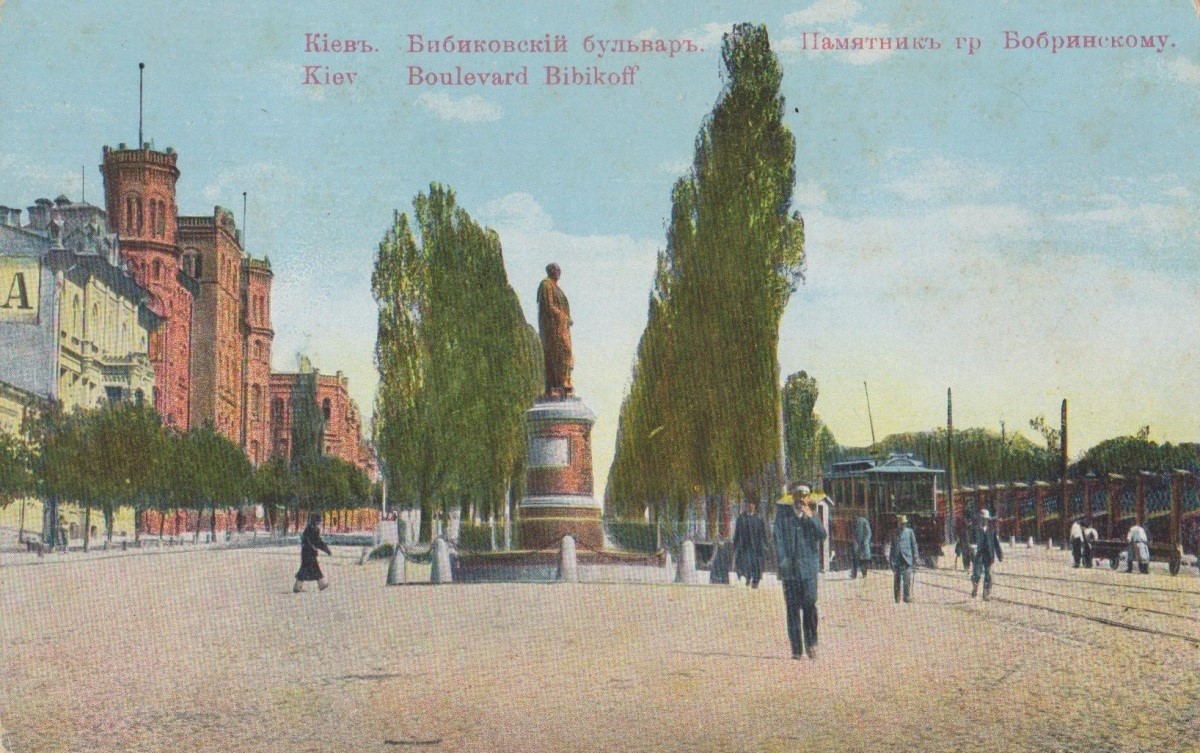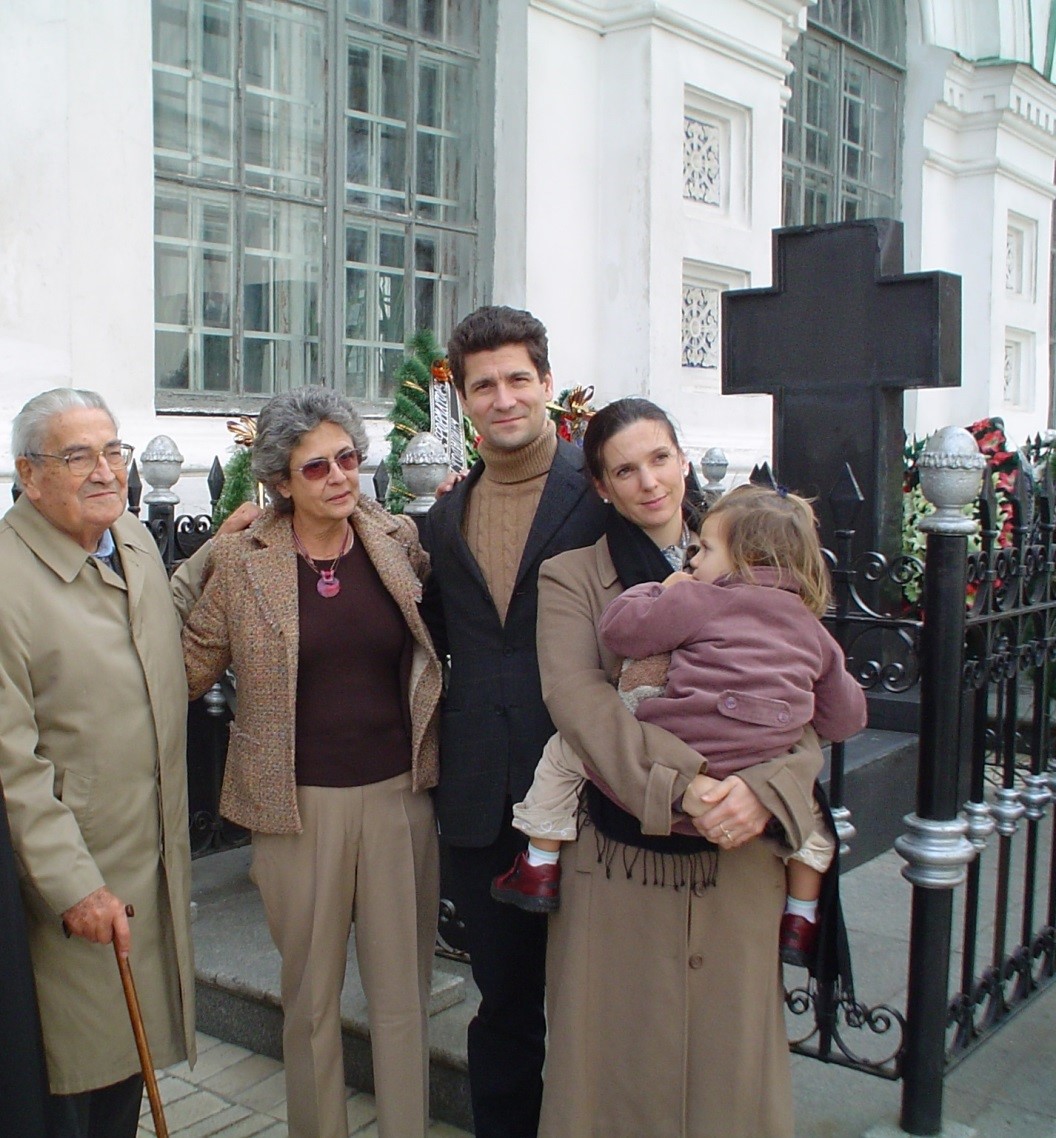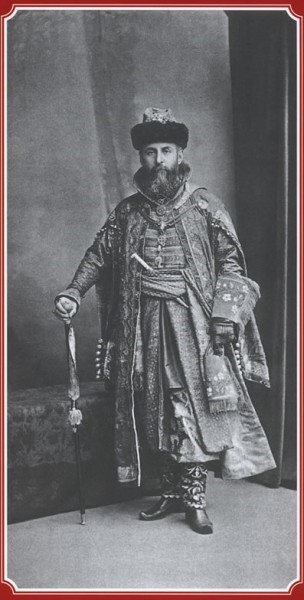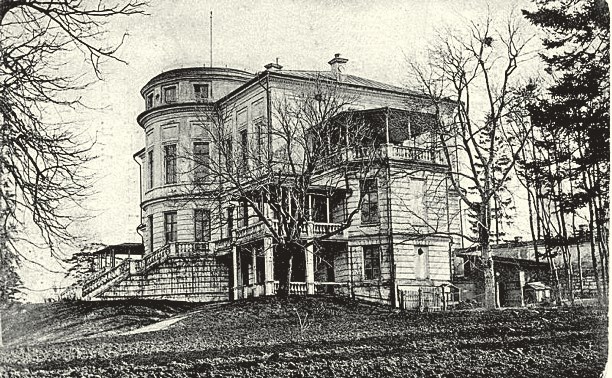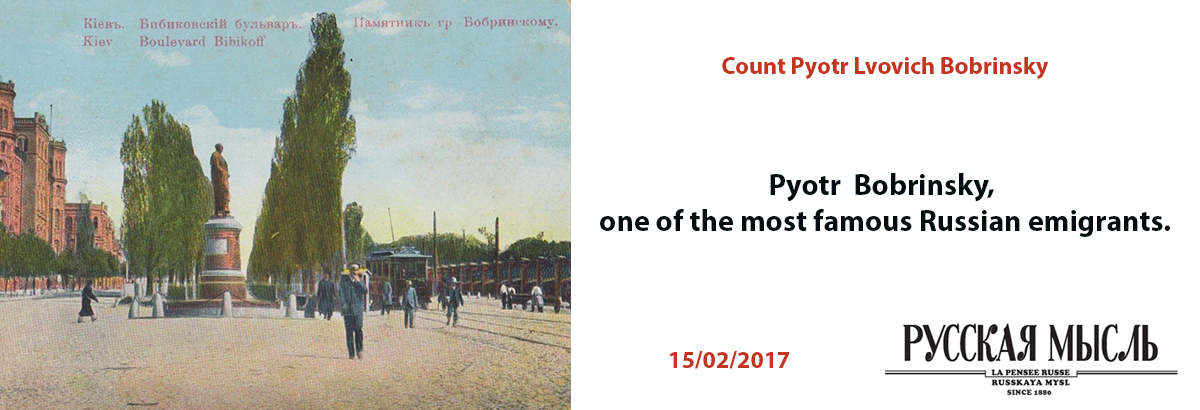The interview was conducted by Neonilla Pasechnik
The catastrophes that we observe are a result of the breakdown of the relationship between man and God.
Pyotr Lvovich Bobrinsky, a Parisian by birth, lived in Kiev for over eight years, the city where in the nineteenth century grateful Kiev residents erected a monument to his great-great-grandfather, Count Alexey Bobrinsky.
-What do you think of the public plans for the rebuilding of a historical monument to this brilliant industrialist and benefactor of the past?
-Kiev holds an important place in my life. Ages ago there was a monument to my great-great-grandfather Count Alexey Alexeyevich Bobrinsky here. He was a businessman and philanthropist who, in 1838, founded the sugar-beet industry in Smela, in what is now the Cherkassy region. Count Bobrinsky is also famous for originating the construction of railways in Russia, and also for establishing elementary schools which offered a three-year course and a curriculum which was the equivalent to that of a parish school. Through the efforts of its father-superior, Archimandrite Isaaky (Andronik), a similar industrial school was recently established in Kiev, at Goloseyevo Monastery. Count Bobrinsky was one of the founders of Kiev Polytechnic Institute as well. In recognition of his services, the grateful residents of Kiev put up a monument in Bibikovsky Avenue (now Taras Shevchenko Avenue). It was the first monument that was built to honour, not a tsar or a military man but a manufacturer.
Kiev is the city of my ancestors on both my father’s and my mother’s side. Pyotr Arkadyevich Stolypin, Prime Minister of the Russian Empire, who was assassinated in Kiev at the hands of a terrorist, was my great-grandfather. His daughter, Elena Petrovna, was the spouse of Prince Vladimir Shcherbatov whose estate was situated in Nemirov. In 2006, my parents (then my dad was still alive) and I visited Nemirov. We found the graves of my grandmother, Princess Maria Shcherbatova’s, young sisters who had been shot by a firing squad in 1920 by the order of Trotsky. – A panikhida [a memorial service]was performed there, and another panikhida was performed at the grave of Pyotr Arkadyevich Stolypin (after whom I was named).
People who live in exile are in a strange situation. They are keepers of history as they have a place where they had (for generations) been living but which was left behind, and this means that they have strong roots which are able to produce new shoots. But psychologically it is difficult. My father Leo Alexeyevich was born in 1918 in Kislovodsk, and for twenty-five years he lived as an involuntary emigrant without a passport: instead he had a document which indicated in a humiliating way that he was apatrite [a stateless person]. Despite everything, Dad tried to enlist in the French Army, but it was too late as the Second World War had broken out. And it was only after the war that my father was given a passport and obtained French citizenship. In some sense, he was between the first and the second generations of emigration. It is possible to unite these two worlds: the ‘old’ and the ‘new’ Russia, but only through the Orthodox Church.
I have an interesting document of 1918 which is signed by Skoropadsky (the Hetman who was considered the supreme ruler of the Ukraine ed. note). My grandfather, Count Alexey Alexeyevich Bobrinsky, and his wife, Countess Natalia Ferzen, applied to the Hetman for Ukrainian citizenship because, from 1918, the Kievan lands were named Ukraine. But my ancestors always felt themselves to be Russian. Children of emigrants have a special sense of identity. If this were to be taken into consideration in the homeland of our Russian forebears, then we would happily work here.
-You are a nephew of Protopresbyter Boris Bobrinsky. Does your family traditionally keep Orthodoxy?
-My uncle, The Very Reverend Boris Bobrinsky, is already ninety-three, and he does not serve at the Cathedral of St Alexander Nevsky in Rue Daru, Paris, any more. He moved to the village of Bussy-en-Othe where he has since lived with his matushka [priest’s wife], Elena, at an Orthodox convent. The spouses communicate with each other only in Russian, that is why Father Boris speaks excellent old Russian. The same, however, cannot be said about my Russian!… They have not taken the monastic vows yet, but this is all still ahead. On Sundays and Church festivals Father Boris takes confession during the Liturgy, but, of course, he no longer celebrates the Liturgy himself… The protopresbyter visited Kiev on several occasions in connection with the publication in Kiev of his book, The Paternal Compassion, in Russian. I know this work in French.
The revival of the Orthodox Church can become a uniting factor for all Slavic and Orthodox peoples who are resisting the negative phenomena which have been observed in Western Europe. Many European states are losing their link with the Christian tradition which, fortunately, is not the case in post-Soviet countries. And now, in Kiev, I see a society in which the Christian religious tradition is an integral part of people’s lives. Spiritual life is being revived in Russia and the Ukraine. Both countries may set a good example to such states as Germany and France where today Christianity is in decline. But after the horrific military conflict in the historical lands of Novorossiya [New Russia], which were unleashed by destructive sects, life has become more difficult in economic terms: which is precisely what has been taking place in Europe for a long time.
The world economic crisis which we are experiencing now occurred because people have deviated from Christian values. They think that money is the ultimate value in life. If your values are measured by the contents of your purse, that is abominable. There is the Greek word hubris [extreme pride]which originally meant the grave sin of not fearing God: believing that man will live forever: and believing that he is the judge and the master of himself. The catastrophes that we witness are a result of the breach between God and man. I feel certain that Kiev residents unveiled a monument to the industrialist Count Alexey Bobrinsky because he never lost his connection to God, and he succeeded in stabilizing the economic situation, not only in Kiev but also in remote regions of the country.
-The personality of Catherine II (Catherine the Great) is one of the most controversial. The Counts Bobrinsky descend from the Russian empress, don’t they?
-I have not especially explored the life of my ancestor Count Alexey Grigoryevich Bobrinsky, son of Catherine the Great (by Count Orlov). But, as a matter of fact, the empress herself, as you quite rightly noted, was of Russian origin too. Her father was Ivan Ivanovich Betskoy, an illegitimate son of Prince Trubetskoy.
If we accept the account of the empress’s Russian father, then Catherine is blamed for the secularization of the Church lands. In any case, Betskoy did not receive a traditional Russian education: not only was he not brought up in the church, and so not an ecclesiastical person, he also had poor knowledge of the Orthodox tradition. He gave priority to European values. Betskoy did not understand the significance of monasteries in Russia, given the negative attitude towards them in Europe. Undoubtedly, thereby he provoked discontent among the conservative members of Russian society, specifically the displeasure of the famous historiographer, Prince Mikhailo Mikhailovich Shcherbatov, an ancestor of mine on my grandmother’s side. In addition to writing his History of Russia from the Earliest Times, Prince Shcherbatov also engaged in statistical investigations which resulted in his critical essays, On the Corruption of Morals in Russia. This work was published half a century after the author’s demise outside Russia – in London. Catherine was able to buy the unique historical archive of Prince Shcherbatov which contained manuscripts from the library of the Monastery of the Caves because the prince-historiographer was a descendant of the Holy Prince Michael of Chernigov, and he had thus inherited the manuscripts from his ancestor. The wise Empress Catherine preferred to keep those contemporaries who disagreed with her policies close to her: so she appointed Prince Shcherbatov President of the College of State Revenue (the prototype of the future Ministry of Finance) for ten years. By the way, the present location of Prince Shcherbatov’s archive, which was obtained by Catherine II, is unknown.
After the accession to the throne of Catherine II, a new understanding of marriage which was at variance with the Holy Scriptures infiltrated Russia. The following four key principles had always been regarded as the foundation of family life in Russia: separation from parents: constancy and stability: life side-by-side with no conditions and restrictions, which means a unity of life which is based on the ability to listen and forgive: and close physical relations which can bring joy provided the first three principles are adhered to.
Apostle Paul provides a model for arranging married life: ‘Wives, submit yourselves unto your own husbands, as unto the Lord’. It means that the main task of a wife is obedience. The latter cannot be said of Catherine II whose duty was to rule. Now same-sex ‘marriages’ are legalised in Europe which, according to the Holy Scripture, is a sin. But there is no doubt that Russian families in Europe uphold Orthodox marriages.
-Pyotr Lvovich, your grandfather appealed to Hetman Pavlo Skoropadsky, head of an Orthodox state (the Ukraine), with the request to grant him Ukrainian citizenship. But you preferred a vyshyvanka [an embroidered Ukrainian shirt which is part of the national costume]to the military uniform! Is this fact indicative of your liking for Vasyl Vyshyvanyi (the Ukrainian pseudonym of Archduke Wilhelm of the House of Habsburg)?
-I do wear the Ukrainian embroidered shirt in informal situations because it is hand-made! But, alas, it is simply impossible for me to learn and master Ukrainian along with five other European languages. Apparently, I am not such a good fellow as Vasyl Habsburg…
Rather, I am among those of whom Hetman Skoropadsky used to say that they support the Ukrainian culture but under no circumstances will they renounce their own culture. For me this means: first of all, Russian culture: as well as the Italian culture of my grandmothers, because my mother’s roots go back to Dante Alighieri: and also the French and German cultures in which my wife was partially brought up. But our children attend a Ukrainian school in Kiev.
Without doubt, in the history of the Ukraine , Hetman Pavlo Skoropadsky’s personality is seen as the most progressive. General Skoropadsky led an anti-German coup d’etat, similar to the attempted coup by General Lavr Georgievich Kornilov, but after having learnt the lessons from Kornilov’s failures. The Hetman believed (as later did General de Gaulle in France) that military-bureaucratic dictatorship and restoration of private property were vital for guaranteeing ‘peace in the country’.
Pavlo Petrovich addressed the Congress that elected him Hetman of All the Ukraine: ‘I am taking the burden of temporary power on myself not out of self-interest. You are well aware that anarchy is spreading everywhere, and only a strong government is capable of putting things in order. Landlords, I will rely on you and I ask God to give us strength and perseverance for the salvation of the Ukraine’. Next a moleben [a prayer service]was performed in Sofiyskaya Square and the Hetman’s power was blessed. The Orthodox clergy, headed by Archbishop Nicodemus, blessed the Hetman and held a procession of the cross with a moleben ‘for granting authority over the Ukraine to Hetman Skoropadsky’.
During the whole period of Hetman Skoropadsky’s reign no soldier was sent to help the German and Austro-Hungarian Armies. Interestingly, in his political declarations Skoropadsky himself proclaimed that he was not a monarch and that he was not striving to rule by establishing a new Skoropadsky Dynasty (as Soviet historians later argued). It can be said that the form of government known as the Ukrainian hetmanate tried to become firmly established by means of regaining the power which had been lost by the ancient ruling dynasties who were the offspring of Ruric or Gediminas: the Princes Volkonsky, Dolgoruky, Shcherbatov, Baryatinsky, Lobanov-Rostovsky, and Trubetskoy. That aristocratic renaissance was a response to the international modernization of the Bolsheviks. The hetmanate’s functionaries were men of Russian culture who were creating Ukrainian culture. I would say that it was Hetman Skoropadsky who implemented Pyotr Arkadyevich Stolypin’s reforms on the autonomy of the borderlands.
-The names of your prominent ancestors are connected with Kiev and Lvov. In your opinion, why does the new state authority prefer military operations to the development of industry, education and diplomacy?
-As I said earlier, the outstanding Prime Minister, Pyotr Arkadyevich Stolypin, was shot in Kiev by a terrorist named Dmitry (Mordekhai) Bogrov who was a son of a Kiev lawyer who had attended the Assembly of Nobility. Stolypin is buried near the grave of Vasily Kochubey at the Monastery of the Caves, Kiev. It is absurd that, instead of participating in public administration and using Russian which has already become one of the official languages even in the UN, and despite being a descendant of a distinguished diplomat who prepared (and wanted to bring into effect) the law of autonomy and self-government of the Russian borderlands, I have to extend my visa annually in order to work in Kiev. I am not young enough to learn another language, being a foreigner in my forefathers’ homeland! As for the new Ukrainian Government (which came to power not diplomatically but as a result of a revolution in a very destructive way), it has something to learn from its predecessors: my ancestors. But it seems the authorities prefer to ignore our presence. Likewise, they ignore the heritage of Count Alexey Bobrinsky: a businessman, owner of sugar factories, and founder of the Kiev Polytechnic Institute. Were people in the nineteenth century really less intelligent than now? Then why did the grateful Kiev residents set up a monument to Count Bobrinsky in Bibikovsky Avenue?
Throughout the twentieth century miserable statues of Lenin (the founder of USSR), and just one writer: Taras Shevchenko (who, by the way, wrote his prose in Russian!), multiplied. Nikolai Gogol was not listed among the Ukrainian writers in spite of the themes of his works. Early in the twentieth century in Lvov one could be imprisoned for reading Gogol. As regards Galician Rus′, 100 years ago my granduncle was appointed the Military Governor of Lvov and Adjutant General of Tsar Nicholas II. And my grandfather, Count Alexey Bobrinsky, who knew the needs of that part of the state very well, was a member of the State Duma and headed the Charity Council in Galician Rus’. There is a fine article in a newspaper which tells how enthusiastically Lvov residents met the emperor and rejoiced at the reunion of Russia.
